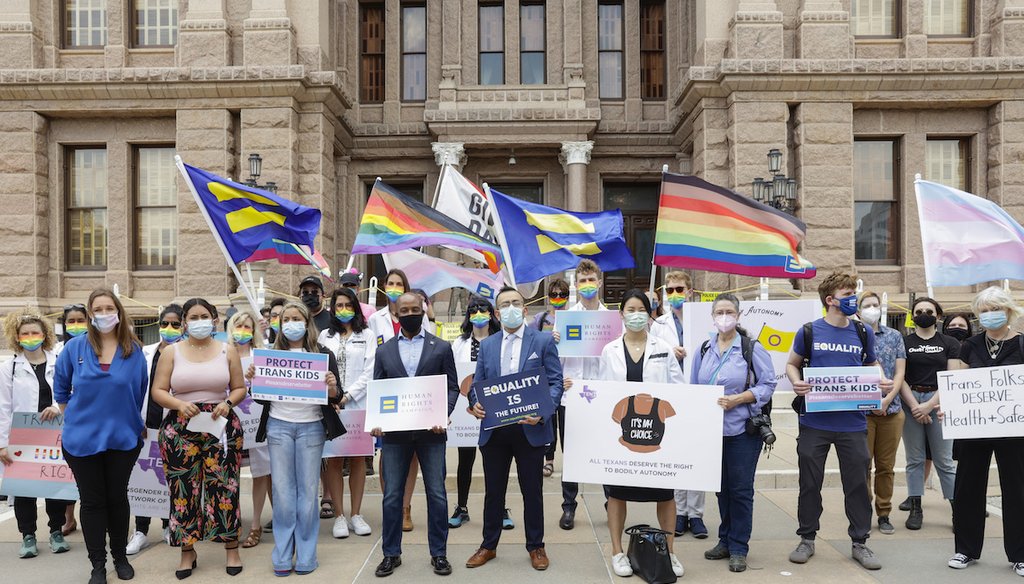Stand up for the facts!
Our only agenda is to publish the truth so you can be an informed participant in democracy.
We need your help.
I would like to contribute

LGBTQ advocates including health care professionals, parents of transgender children and representatives from several organizations rally at the Texas State Capitol May 4, 2021, opposing legislation that would criminalize gender-affirming care. (AP/HRC)
If Your Time is short
-
Following the deadly mass shooting at a Christian school in Nashville, Tennessee, conservative lawmakers and commentators spread claims that transgender people are becoming radicalized toward violence.
-
After consulting the data and experts who study extremism and terrorism, we found no credible evidence of any widespread trend of transgender extremist radicalization.
-
The vast majority of studies showed that trans people are more likely to be crime victims than perpetrators.
Conservative politicians and pundits warning of a rise in "trans terrorism" after the Nashville, Tennessee, school shooting aren't backed up by data, experts told PolitiFact.
Police said the person who shot and killed six people at Covenant School March 27 was transgender, but there is still a lot we don't know about the suspect or their motive.
Minutes after police announced that the suspect was transgender, the hashtag #TransTerrorism started to trend on Twitter. U.S. Rep. Marjorie Taylor Greene, R-Ga., tweeted about threats of "Antifa driven trans-terrorism," and shared an image that seemed to depict a threat.
Commentator Benny Johnson, a podcaster who works with the conservative nonprofit group Turning Point USA, used similar language in a March 27 tweet that also spread on Facebook.:"One thing is VERY clear: the modern trans movement is radicalizing activists into terrorists," he wrote, naming four recent incidents in which the shooter was said to be either trans or nonbinary. Nonbinary people identify as neither male nor female.
On Fox News’ "Tucker Carlson Tonight" on March 28, host Tucker Carlson claimed the transgender movement seemed to be "getting militant and possibly dangerous" and described a rising threat from the "extremist trans fringe." He said, "We seem to be watching the rise of trans terrorism."
But after consulting the data, and domestic extremism experts and researchers, we found the opposite: There is no evidence of a widespread trend of transgender radicalization toward violence. On the contrary, trans people are more likely to be victims of crime than to be perpetrators of it.
PolitiFact reached out to Greene, Johnson and Fox News for comment and whether their teams had broader evidence of trans communities being radicalized. We did not receive a response in time of publication.
Radicalization is generally a process of becoming more extreme in one’s beliefs, actions or politics.
Sophia Moskalenko, a social psychologist and radicalization researcher, shared her definition of the term from her book, "Radicalization to Terrorism: What Everyone Needs to Know." It defines radicalization as "a process by which individuals, groups or large publics become increasingly accepting of violence for a cause. Terrorism is an endpoint; radicalization is the road that leads to that end point."
People can become radicalized by personal grievances or identity-group grievances, but Moskalenko wrote that it’s rare for someone to "move from sympathizer to activist by suddenly undertaking some major risk or sacrifice." Typically, she wrote, a person’s progress into violence, or into a terrorist group, is slow and gradual.
Researchers who study terrorism and extremism told us they knew of no widespread threats of growing radicalization or violence from the trans population.
"No, I haven’t seen any evidence of this. In fact, it’s the opposite," said Mia Bloom, a Georgia State University professor and member of the radicalization expert advisory board for the Anti-Defamation League, an anti-hate and anti-bias advocacy group.
"When you have this kind of coordinated, concerted campaign against a community, the community becomes insular, their vulnerabilities spike, and that's not when they turn to violence," she added. "The violence is going to be against them. It’s very unlikely the violence will be perpetrated by them."
Police have not released a motive in the Nashville shooting. Metro Nashville Police Chief John Drake said the perpetrator, 28, was under care for an emotional disorder and had stored guns at home.
Victor Asal, a University of Albany political science professor, said he has seen nothing to signal a legitimate threat of growing radicalization among transgender people.
"That doesn't mean that trans people can't be violent or extremist — anyone can," Asal said. "But, as far as I'm aware, there is no higher uptick among transgender people than anybody else. Could there be growing anger? Yes, certainly. Do I think they are going to be radicalized and turn to violence? Maybe a couple, but I haven’t seen any evidence of an overall trend."
Jessica Emami, an adjunct professorial lecturer of sociology at American University, said many recent mass shootings have been perpetrated by lone actors, rather than organized groups. She warned against generalizing the actions of one person to a whole group.
"If you look at the overwhelming number of people in those groups, they're not violent, or even looking to be violent and they're productive members of society," Emami said. "I think there's going to be a lot of trans blaming that's unnecessary."
Andy Ngo, editor of The Post Millennial, a conservative website based in Montreal, told Carlson March 28 that research in Canada supports the notion that trans people were becoming radicalized.
Ngo didn’t respond to us, but we found a Canadian survey study from 2022 that explored radicalization among college students during the COVID-19 pandemic. One finding suggested transgender youth were more supportive of violent radicalization, but experts we spoke to criticized the study’s small sample, methodology and quality.
Bloom said the paper raises ethical concerns because it involved teens and doesn’t mention parental consent. "There is also missing information regarding mental health," she said. "The radicalization might be secondary to mental health problems."
Asal criticized the study’s sample size — 79 transgender people out of a 3,000-person survey. "It's a minuscule amount of people that they’re looking at," he said. "And I'm not seeing an argument here for why transgender people would be extremists."
Some conservatives who were spreading the notion of "trans-terrorism" also zeroed in on a flier that promoted a protest called "Trans Day of Vengeance," which is planned for April 1 in Washington, D.C. It was organized by the Trans Radical Activist Network, a group describing itself as a network of activists and community organizers working though education, legislation and advocacy for transgender and nonbinary rights. The group’s size and scope were unclear.
In a press release following the shooting, the group expressed horror, outrage and grief over the lives lost and violence committed, but rejected "any connection between that horrific event and ours." The group said "vengeance," as it uses the word, means "fighting back with vehemence," and that its goal is to fight against unjust and inhumane systems, not individuals. "TRAN does not encourage violence and it is not welcome at this event," its webpage says.
Twitter took down images of the TRAN flier, referencing rules against language that incites violence. "‘Vengeance’ does not imply peaceful protest," tweeted Ella Irwin, Twitter’s vice president of product who oversees trust and safety.
The Department of Homeland Security did not respond to PolitiFact’s inquiry about whether it has seen evidence of growing extremism in the trans community.
The FBI told us in a statement that the agency couldn’t comment on our specific questions. But the agency did say that belonging to a group is protected by the First Amendment, and that the agency "will never open an investigation based solely on protected First Amendment activity."
"We focus on individuals who commit or intend to commit violence and criminal activity that constitutes a federal crime or poses a threat to national security," the agency added.
Research suggests that transgender people are more likely to be crime victims than perpetrators.
According to the Williams Institute, a public policy research group on sexual orientation and gender identity issues at the University of California, Los Angeles, transgender people are four times more likely to be a victim of violent crime. In 2022, the institute found that LGBTQ+ people are nine times more likely to be a victim of violent hate crimes.
And the number of trans people killed annually, as tracked by the LGBTQ+ advocacy group Human Rights Campaign, has been increasing. The organization recorded 304 instances of fatal violence against transgender and gender nonconforming people from 2013 to 2022. 2021 had the highest recorded death count for transgender and nonconforming people, 59.
This violence has an outsized effect on people of color, with 85% of all transgender victims being Black trans women.
Our Sources
Fox News, Tucker Carlson Tonight, March 28 2023
Facebook post, March 28, 2023
Twitter post by Benny Johnson, March 28, 2023,
Twitter post by Marjorie Taylor Greene, March 28, 2023
Twitter post, March 28, 2023
NBC News, Twitter cites rules against violent speech in restricting Marjorie Taylor Greene's account, March 28, 2023
Washington Post, The data is clear: There is no ‘clear epidemic’ of transgender mass shooters, March 30, 2023
Dictionary.com, Radicalization definition, Accessed March 29, 2023
Amazon, Radicalization to Terrorism: What Everyone Needs to Know, 2020
CNN, Covenant School shooter was under care for emotional disorder and hid guns at home, police say, March 29, 2023
Trans Radical Activist Network, About, Trans day of vengeance, Accessed March 29, 2023
Frontiers in Psychiatry, Meaning in Life, Future Orientation and Support for Violent Radicalization Among Canadian College Students During the COVID-19 Pandemic, Feb. 2022
Williams Institute, Transgender people over four times more likely than cisgender people to be victims of violent crime, 2018
Williams Institute, LGBT people nine times more likely than non-LGBT people to be victims of violent hate crimes, 2019
Human Rights Campaign, An Epidemic of Violence: Fatal Violence Against Transgender and Gender Non-Conforming People In the U.S. in 2022 [Report], 2022
Email interview, Brian Levin director of the Center for the Study of Hate & Extremism at California State University, March 29, 2023
Phone interview, Mia Bloom professor of communication and Middle East studies at Georgia State University professor and member of the radicalization expert advisory board for the Anti-Defamation League, March 29-30, 2023
Email interview, Sophia Moskalenko, psychologist and author on radicalization and terrorism, March 29, 2023
Phone interview, Victor Asal political science professor at the University of Albany, March 29-30, 2023
Phone interview, Jessica Emami, adjunct professorial lecturer of sociology at American University, March 30, 2023





















